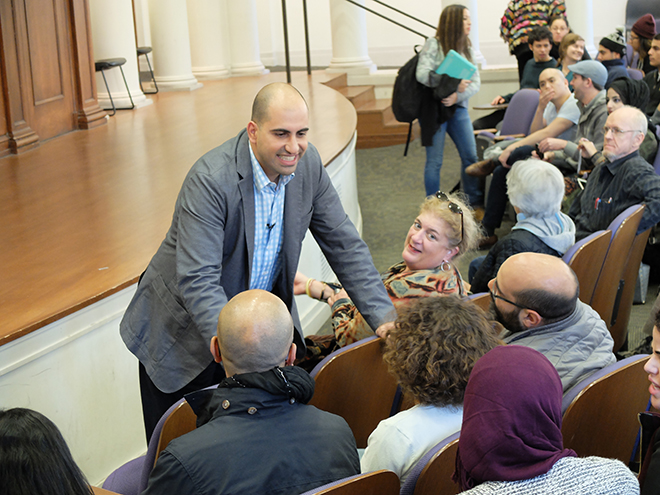
Dr. Steven Salaita has no home, no income and no healthcare. He sold his house, quit his job as a professor of English at Virginia Polytechnic Institute and prepared to move his family to Champaign, Ill. for a new life as tenured professor of American Indian Studies at the University of Illinois Urbana-Champaign.
The U of I Board of Trustees voted on Sept. 11 to rescind Salaita’s offer of employment. Before the vote, a student group had presented to the board a selection of tweets from Salaita’s Twitter account concerning the Israeli-Palestinian conflict, citing them as evidence of hate speech and anti-Semitism. Major donors allegedly said they would pull funding from the school if Salaita was hired.
Salaita spoke in Harris Hall on the first stop of his Chicago area tour on Monday night. He discussed a combination of his termination from U of I, his views on the current Israeli-Palestine conflict and the overlap between the two for about 45 minutes. After his address, the student group Students for Justice in Palestine mediated an open Q & A forum.
Salaita spoke about how he felt he was wrongfully terminated by the U of I Board of Trustees. He stressed how he believed that donors and big money played too large a part in the decision making of universities. John Wilson, co-editor of the Academe Blog, felt similarly.
“If what you’re doing is extramural, outside of your work or occupation, that should not be used to judge you,” Wilson said. “This is a pretty clear-cut example of someone who is being fired without consideration of their academic work and purely for what they said [outside the classroom].”
Andy Thayer, co-founder of the Gay Liberation Network and organizer of Salaita's Chicagoland tour, also expressed his disappointment with the board of trustees decision.
“The fact that the U of I board, after ten minutes of complaints saying 'oh we have to fire this guy’ spoke volumes about what is so wretched about how politics are run in this state.”
Not everyone agreed that the first amendment protected Salaita’s remarks on Twitter, however. Jonathan Kamel is the President of the student group Wildcats for Israel.
“I would classify some of his tweets as hate speech and hate speech is not protected by the first amendment,” Kamel said. “If you read the tweets it’s completely justifiable what U of I did.”
Salaita then moved on to make several comments on the nature of the Palestine conflict. He listed multiple statistics on the destruction and death toll in the Gaza strip in the most recent conflict. Audience reactions to his various comments varied.
“The fact that he even said that Jews are not an indigenous people to the land of Israel is completely idiotic,” Kamel said.
Salaita ended his speech with one final and definitive statement: “The evidence in my case is clear. I’m no anti-Semite. I’m no terrorist. I’m no bully. I’m no savage,” Salaita said. “I’m a man who suffered because I condemned Israeli policy in language appropriate to a horrible occasion rather than in the meek platitudes of civility.”
Editor's note, Oct. 7, 2014 at 7:30 p.m.: The original version of this piece incorrectly stated that the student moderators were from Sustained Dialogue and not Students for Justice in Palestine, and also contained a typo in the final quote from Salaita. Additionally, a line that made prejudicial assumptions about audience members was cut. North by Northwestern regrets the error.